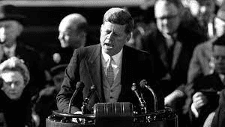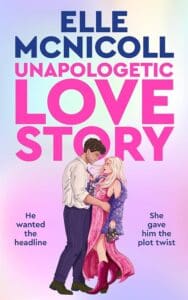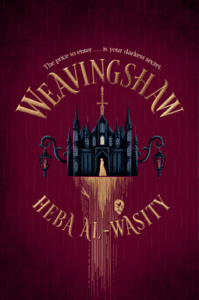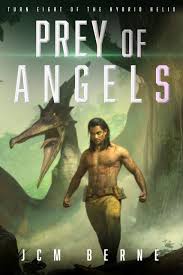My slot on the blog today is a guest post from Author D. Ellis Overttun. It is a really thoughtful look at themes the author explores in his books as well as an excerpt from his upcoming release and 4th book, Mirror in Time. Enjoy!

Like most of the people I have met on social media, I met Jason (@CloakTraveling) by way of my wife, Natasha (@neoverttun). It was at her suggestion that I took a tour of FanFiAddict.
I was once told that author’s need an eye‑catching cover to get the reader’s attention. The same concept holds true for blogs. The first thing you notice (actually, it hits you) on FFA is the header. “BAM!” as Emeril would say. It catches your eye and captures your imagination. (The ageing is also a nice touch.) You could remove all the text, and there would still be no doubt what this site is about.
Natasha says (and I agree) the artwork is spectacular, especially the seamless transitions among the various depictions. Since she does all my visuals, she can appreciate it more than I can. I just say it looks great. Apart from that, the layout is easy to read and follow. Some sites are like going through a maze. When I finally find what I was looking for, I feel like I should get a piece of cheese.
Jason is also part of a cadre of bloggers on FFA who write thoughtful and balanced reviews. They generally can put their fingers on the elements of characters and how they interact with each other and the plot. Authors appreciate that.
After my tour, I said, “I got to get me a guest post on this one!” This is my second appearance on FFA. The first one was a post and WWIT about the prologue of my third book, Prophecy: Eve of Darkness.
I am delighted and honored to have this opportunity to share my thoughts about my fourth book, Mirror in Time.
Our story so far…
ARC “Prologue” posted on Witty and Sacrastic Bookclub
ARC eChapter 1 – “Debriefing and Consultation” posted on From Belgium With Book Love
ARC eChapter 2 – “History” posted on On The Shelf Reviews
ARC eChapter 3 – “Newbie” posted on Like Herding Cats Blog
ARC eChapter 4 – “Static” posted on The Swordsmith
As night falls, a lone atmospheric vehicle has come under attack on its final approach to a high‑altitude research facility known as the “Jomo Langma Mountain Observatory”. Stars that should fill the sky have been obscured by a random patchwork of contrails that have come to be known as “ribbons in the sky”.

However, Prefect Godvina, AV Sundog’s lone passenger, is now recovering in the Observatory’s medical facilities, a result of stress caused by the evasive maneuvers of the episode. Director Jo’el, head of the Observatory, has been keeping vigil at her bedside. His concern for her is personal. Was this the reason for her visit?
We learn the attack was the anticipated result of a plan to draw out dissident elements. Prefect Tarsus, architect of the plan, is pleased on two fronts. About the mission was to be expected. However, as to Godvina’s condition has come as somewhat of a surprise to Agent Thalia, Sundog’s pilot, and Agents Mica’el and Gabri’el, two of her escorts. It spoke to rumors of a prior relationship between the head of Security and the head of the Cosmological Data Collection and Compilation Center. These rumors are seemingly confirmed when an angry Godvina bursts into a secure room to confront Tarsus, and Thalia is later tasked with covert surveillance of the fiery Prefect to determine the exact nature of her visit to the Observatory.
Jo’el’s tenure as Director of the Observatory had been a direct result of the ribbons in the sky and their seeming adverse causal affect on seismic activity and climate of the planet. His research had led him to conclude the ribbons were an extinction event. He has found a solution, a portal to another universe. However, there was no way to access it. If only there was more time…
His plan: Go back in time before access to the portal becomes compromised.
He will not be going alone. His two lifelong friends, Chief Psychology Officer Auberon and Chief Physician Kyros, will accompany him on this one‑way journey. However, temporal mechanics was not his main area of study. That is why he has asked Godvina to come to Jomo. He needed a sounding board, someone to check his logic and his calculations. There was no one better than the prefect of CD3C.
He had originally intended a purely academic discussion.
However, Thalia’s scrutiny has thrown a spanner in the works. She had been unable to eavesdrop on their meeting, a result of one of Auberon’s very unique abilities. It would only be a matter of time until it would draw unwanted attention to Jo’el’s plan. Now, he had no choice but to flee Jomo with his two friends and a recently recruited CD3C Prefect. Their objective: Exit a facility under military jurisdiction, make their way through some of the most inhospitable terrain on the planet and head to the very people who attacked AV Sundog.
I have found that most people tend to read ebooks. However, I write in terms of a paperback then break it up into smaller bits when it comes time to publish in digital format. “Our story so far” is the first paperback chapter entitled “Report”. Now that readers have gotten an introduction to the characters and basic plotline, I think it is a good time to talk about what overlays the story.
The staple of all sci‑fi is, well, science. So, that has to be one of the main themes. Mirror in Time is a standalone story about, as the title suggests, time travel. So, how is that accomplished? Generally, there are three ways to go. The first is technology à la flux capacitor, time displacement equipment or tardis. The next is fantasy à la time stone, time‑turner or good old‑fashioned spells. Mirror is the third category “naturally occurring phenomena”, specifically an Einstein‑Rosen bridge. Although, it’s never referred to by name. That might hint that this is not earth or some time so far in the future that the connection has been lost.
Technology is a staple of this genre. It is either gadgets that do amazing things or a ubiquitous framework of the environment. In “Our story so far”, we have seen the nexus (a smartphone on steroids), holo‑X belts (short for holographic exoskeleton) and very smart POS terminals. In terms of ubiquitous, computers are everywhere and completely interactive. But why have all this stuff? It must be in service of the storyline. Technology helps to set the mood for the reader, much like candle light in a romantic dinner.
Mirror in Time is speculative sci‑fi. It asks the question: What would it be like to go back in time? Wander away just a little from the present, and you have to deal with changes in life, language and culture.
I don’t think I’m spoiling anything if I told you just like Jimmy Castor, “What we’re gonna do right here is go back, way back, back into time.” Although, there are no troglodytes in this story.
Go back far enough, and you would have to deal with viruses and bacteria that would make the past as different as stepping on to an alien planet. I was inspired by a profound observation made by H. G. Wells in War of the Worlds, “By the toll of a billion deaths, man has bought his birthright of the earth…”
I’m a huge Trekkie, but it’s always bugged me how they can just go to another planet. (In pre‑covid, we couldn’t even travel to certain countries without being vaccinated.) I suppose it’s assumed, but then the away team eats and drinks the local cuisine. I suppose they got shots for that too, but that doesn’t work for first contact. As an example, see “The Corbormite Maneuver” TOS.
I have always found it a treat to listen to Professor Mark Pagel of the University of Reading. He has studied how language evolves and has evolved. Take English as an example. You can see how the language has changed from Beowulf (7th century) to The Canterbury Tales (14th century) to Romeo and Juliet (16th century). To be clear, I have never read the first two in their original form. Even listening to them is completely unintelligible to me. Although, you have a better chance of grasping the meaning of The Canterbury Tales in Middle English if you spend the time and read it. I have taken this retrospective approach into account in the plot.
Here is the perfect spot to put the visual my wife, Natasha, created for this post. It will give you a feel for what I was thinking.

This gets to another SFF pet peeve of mine — communication. In Star Trek, as an example, it is accomplished seamlessly via the universal translator. However, one thing this gadget cannot do is give cultural context. (As an example, see “Darmok” TNG.) I like the scenes with Kalara in Star Trek Beyond, where you can hear it double‑played, but most of the time, most sci-fi takes it for granted.
When would today’s technology have been regarded as magic? And what would that make us — evil spirits or gods? It makes you think… This idea touches on the history of science and looks at when and how superstition and divining evolved into the scientific method.
More than his bridge, Einstein’s famous equivalence between matter and energy is another theme. The narrative manifestation of E=mc2 pops up time and time again in Mirror. As we have seen in “Our story so far”, Celesti are surrounded by light, and we learn that some can transform that light into wings to fly. There are more examples of moving back and forth between energy and matter, but this is a spoiler‑free post, so I can say no more.
Everything I have discussed so far is in service of a concept that is the fabric of every story ever written or every story that will ever be written. It is best encapsulated by Newton’s third law: To every action there is an equal and opposite reaction. A story opens with one or more MCs. Something happens, and they respond. That is what makes (or breaks) a story. That event spans the gamut from the momentous, like an impending asteroid strike in Armageddon, to the mundane, like missing a subway in Sliding Doors.
While my major was chemistry, I am a student of history. Part of my inspiration for Mirror came from John F. Kennedy’s 1961 inaugural address, in particular: Ask not what your country can do for you–ask what you can do for your country. That same sentiment is also expressed in Ronald Reagan’s “Shining City upon a Hill” farewell address. It speaks to being part of something larger than yourself, of self‑sacrifice and of taking action, not because it’s easy, not to receive credit but because it’s the right thing to do. Readers will see this theme over and over throughout the story. Many may think, “Boy, is this guy naïve! Who does that?” That’s on purpose. It’s why I can add “fantasy” to “sci‑fi” and classify this novel as SFF.
Other books by D. Ellis Overttun

Terra Nova Book 1 – Universe: Awakening
Background to Universe: Awakening posted on Zooloo’s Book Diary

Terra Nova Book 2 – Genesis: Vision of the New World
Themes in Genesis: Vision of the New World posted on The Book Hole

Terra Nova Book 3 – Prophecy: Eve of Darkness
Themes in Prophecy: Eve of Darkness posted on The Bookwormery





[…] ARC “Prologue” posted on Witty and Sacrastic Bookclub ARC eChapter 1 – “Debriefing and Consultation” posted on FromBelgiumWithBookLove ARC eChapter 2 – “History” posted on On The Shelf Reviews ARC eChapter 3 – “Newbie” posted on Like Herding Cats Blog ARC eChapter 4 – “Static” posted on The Swordsmith Mirror in Time Themes posted on FanFiAddict […]